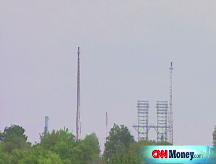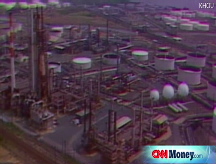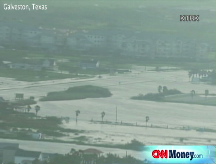Oil slides below $99 - Markets relieved
In a special early-Sunday electronic trading session, crude futures fall after early reports suggest that Ike may not have caused significant damage to refineries.

NEW YORK (CNNMoney.com) -- Oil prices fell below $99 a barrel on Sunday in a special early-start session as traders bet that Hurricane Ike did not cause significant damage to refineries.
"The market is expressing some relief," said Andrew Lebow, a broker at MF Global in New York. "We were worried on Friday that the storm surge would flood the refineries, but right now it looks like that was not the case."
Still, the market was waiting for more information from the region, Lebow said.
Another analyst agreed that the full picture isn't complete. But with refineries out of power, demand for crude will be weaker.
Ike "has hurt the demand side for crude more than the supply side," said Phil Flynn, senior market analyst at Alaron Trading.
Oil was trading down $1.93 to $99.25 a barrel after falling as low as $98.55 in electronic trading, which normally starts at 6 p.m. ET on Sunday. On Friday, oil settled at $101.18 a barrel on the New York Mercantile Exchange.
Prices have fallen nearly $50 off the record high price of $147.27 a barrel, set July 11. As the U.S. and global economies have slowed, demand for energy has fallen off.
Damage to refineries: Refineries are particularly vulnerable to flooding. After Hurricane Katrina, refineries were shut down for between 6 to 9 months due to flooding. Refineries process crude oil into usable products, like gasoline and home heating oil.
The Gulf Coast region houses 42% of total U.S. refining capacity. Texas, where Ike first hit as a Category 2 hurricane, is home to 26 refineries, or more than 25% of the nation's total refining capacity. The 26 refineries can process nearly 4.8 million barrels of crude per day, according to the Department of Energy. Most of Texas' refineries are on the Gulf Coast ports of Houston, Port Arthur and Corpus Christi.
The eye of the hurricane passed directly over the Exxon Mobil (XOM, Fortune 500) refinery in Baytown, Texas, which is the largest refinery in North America and has a daily capacity of 567,000 barrels. The Baytown refinery and 14 others in the Texas Gulf region remained shut down, the Energy Department said Sunday.
Hurricane Ike resulted in a decrease of 3.9 million barrels per day of refinery capacity, the Energy Department stated. Meanwhile, 99.7% of crude production and 98.4% of natural gas production in the Gulf of Mexico was shuttered.
Gas prices have jumped since Ike hit. The average price of regular unleaded gasoline increased 6.2 cents to $3.795 and followed a 5.8 cent rise on Saturday, according to a survey released by the motorist group AAA.
Damage reports: It was still too early to know exactly how much damage was done to oil drilling rigs in the Gulf.
The Minerals Management Service reported on Saturday that two drilling rigs were adrift in the Gulf, loosened from their mooring by the storm. MMS and the U.S. Coast Guard were monitoring the detached rigs.
As the weather in the Gulf clears, the MMS staff, the U.S. Coast Guard and the oil and gas industry will begin flying over production infrastructure to assess damage, according to the statement.
MMS estimated that 591 of the 717 manned production platforms - about 82.4 % - remained evacuated in the wake of Hurricane Gustav earlier this month and after Hurricane Ike.
Tapping the reserves: To counter the disruption caused by Gustav and Ike, the government in the past week has granted 939,000 barrels of oil loans from the Strategic Petroleum Reserve. The SPR is a 700 million barrel government-controlled reserve of crude.
On Sunday, the Energy Department announced that it has agreed to loan 200,000 barrels of oil from the SPR to ConocoPhillips Co. (COP, Fortune 500) The government will loan 109,000 barrels to a Placid Oil refinery along a Shell (RDS.A) pipeline in Louisiana. That followed a 130,000 barrel loan to Placid Oil on Thursday.
Also on Thursday, the government granted 250,000 barrels from the SPR to Marathon Petroleum Co., on top of 250,000 barrels granted on Sept. 8.
Sluggish demand: Crude prices have fallen in the past two months as a sluggish global economy cut sharply into demand for pricey energy.
Because demand has slackened, "crude supplies were pretty ample going into the storm," said Flynn of Alaron Trading.
"Demand for oil is going to be hurt by the storm because of all the businesses, normal day-to-day activity, was shut down across Texas, Louisiana, and across the Gulf," said Flynn.
The disruptions caused by Ike may have driven oil prices higher on Sunday if demand was more robust. "The slowing global demand is also another reason the market is down right now," said Flynn.
The dollar has been climbing against other currencies, weighing on the price of oil. Crude oil is traded in U.S. currency around the globe, and so a stronger dollar means that oil prices go down. ![]()





